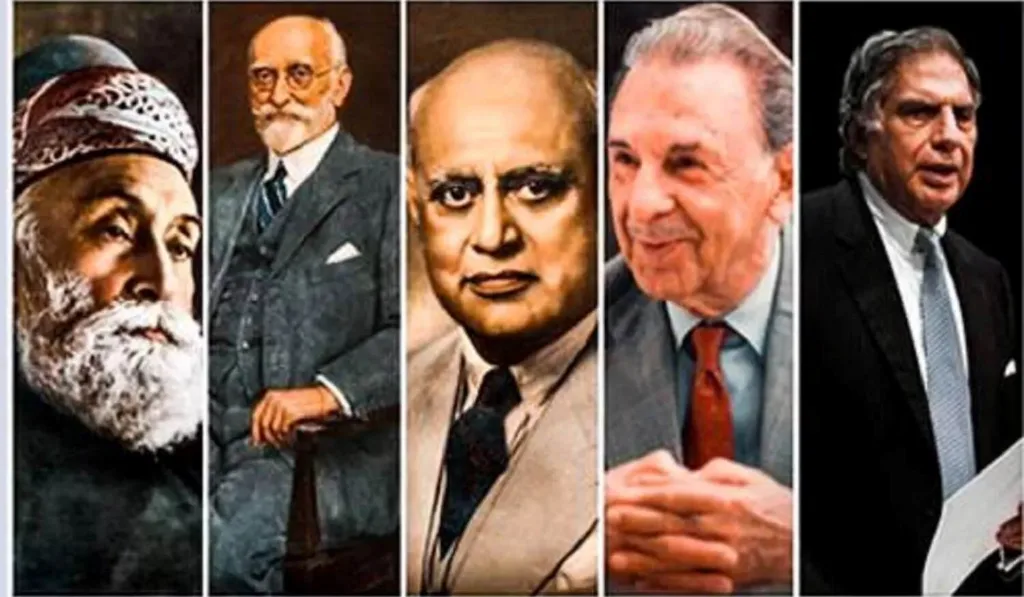
Great Leaders of the Tata Group: Jamshet JI Tata, Sir Dorabji Tata, Sir Nouroj Bai Tata,, JRD Tata, Sir Ratan Tata
Abstract of the article
- The Tata Group is a leading Indian conglomerate founded by Jamsetji Tata in the 19th century.
- Jamsetji Tata had four dreams for the Tata Group: to establish an iron and steel company, a world-class learning institution, a hydroelectric power plant, and a unique hotel.
- JRD Tata was the former chairman of Tata Group, who played a key role in expanding the group’s business operations, promoting innovation and sustainability, and supporting social welfare programs through the Tata Trusts.
- Ratan Tata succeeded JRD Tata as chairman of Tata Group and continued to make significant contributions to India’s economic and social development through business operations, philanthropy, corporate social responsibility, education, and innovation.
- Tata Group has established several educational institutions, including the Tata Institute of Social Sciences, the Tata Institute of Fundamental Research, and the Tata Medical Center, which have played a key role in advancing education and research in India.
- Tata Group has a strong commitment to corporate social responsibility and has implemented several programs to promote sustainability, environmental protection, and community development.
- Tata Group’s contributions to India’s economic and social development have been significant, and the group has played a vital role in shaping India’s growth story. India is always grateful for the contributions of the Tata Group and the Tata family and will continue to look up to them as a source of inspiration and leadership.
To learn more about the Tata Group, read the book The Tatas: How a Family Built a Business and a Nation
The great legacy of the TATAs
Tata Group is a Mumbai-based multinational conglomerate that is among the largest and most respected business houses in India. Founded by Jamsetji Tata in 1868, the company has since grown to become a major player in multiple sectors such as automobiles, steel, hospitality, information technology, and more. It has a presence in over 100 countries and employs over 700,000 people worldwide.
The history of Tata Group dates back to the late 19th century when Jamsetji Tata, a visionary entrepreneur, founded a trading company called Tata & Sons. Jamsetji deeply desired to create an industrial empire that would help India become self-sufficient and economically prosperous. His initial ventures were in textiles, but he soon expanded into other sectors such as steel, power, and hospitality.
One of Jamsetji’s most ambitious dreams was to build a world-class steel plant in India. At the time, India was entirely dependent on imported steel, which made it vulnerable to price fluctuations and supply disruptions. Jamsetji believed that India should be self-sufficient in steel production and set out to build a plant that could achieve this goal. After several years of planning and fundraising, Tata Group established India’s first modern steel plant in Jamshedpur, Jharkhand, in 1907. The plant was named TISCO (Tata Iron and Steel Company), and it quickly became one of India’s largest and most successful companies, providing employment opportunities to millions of Indians.
Jamsetji passed away in 1904, and his sons Dorabji Tata and Ratanji Tata took over the management of Tata & Sons. However, it was JRD Tata, the son of Ratanji Tata, who would go on to become the architect of the modern Tata Group. JRD was a visionary leader who had a deep understanding of India’s economic and social challenges. He believed that businesses had a responsibility to contribute to society and focused on building a sustainable business model that could benefit both the company and the country.
Under JRD’s leadership, Tata Group expanded its operations to multiple sectors such as automobiles, airlines, and information technology. In 1945, Tata Group launched Tata Motors, which would go on to become one of India’s largest automobile manufacturers. In 1953, it launched Air India, the country’s national airline. In the 1990s, it diversified into information technology with the launch of Tata Consultancy Services (TCS), which would become the flagship company of the Tata Group.
Today, Tata Group is a diversified business conglomerate with a presence in multiple sectors such as automobiles, steel, hospitality, information technology, and more. It has expanded its operations globally, with a presence in over 100 countries, and has acquired several international brands such as Jaguar Land Rover and Tetley Tea.
Tata Group’s success can be attributed to its values and principles. The company has always been committed to ethics, transparency, and social responsibility. It has a long history of philanthropic activities and has contributed significantly to India’s social and economic development. The Tata Trusts, a group of charitable organizations, are among the largest philanthropic institutions in India and have contributed significantly to various causes such as education, healthcare, and rural development.
In recent years, Tata Group has focused on building a sustainable business model that can address the challenges of the 21st century. It has launched several initiatives such as Tata Sustainability Group and Tata Centre for Development that focus on sustainability and social responsibility.
Dreams of The Great Tata
Jamsetji Tata, the founder of Tata Group, was a visionary entrepreneur who deeply desired to create an industrial empire that would help India become self-sufficient and economically prosperous. He had several dreams and aspirations for Tata Group, some of which have become a reality, while others continue to guide the company’s vision and mission. Here are four dreams of Jamsetji Tata regarding the Tata Group:
- Establishing a world-class steel plant in India
Jamsetji Tata’s most ambitious dream was to build a world-class steel plant in India. At the time, India was entirely dependent on imported steel, which made it vulnerable to price fluctuations and supply disruptions. Jamsetji believed that India should be self-sufficient in steel production and set out to build a plant that could achieve this goal. After several years of planning and fundraising, Tata Group established India’s first modern steel plant in Jamshedpur, Jharkhand, in 1907. The plant was named TISCO (Tata Iron and Steel Company), and it quickly became one of India’s largest and most successful companies, providing employment opportunities to millions of Indians. - Promoting education and research
Jamsetji Tata believed that education and research were critical for India’s economic and social development. He was a strong advocate for science and technology and believed that India needed to invest in research and development to keep pace with the rest of the world. In line with this vision, Tata Group established several educational institutions such as the Indian Institute of Science (IISc) in Bangalore and the Tata Institute of Fundamental Research (TIFR) in Mumbai. These institutions have produced some of India’s finest scientists and researchers and have contributed significantly to the country’s scientific progress. - Building a world-class hotel in India
Jamsetji Tata believed that India needed a world-class hotel that could compete with the best in the world. He wanted to provide international travellers with a comfortable and luxurious experience that would reflect the best of Indian hospitality. In 1903, Tata Group established the Taj Mahal Palace hotel in Mumbai, which quickly became an iconic symbol of Indian hospitality. The hotel has hosted several prominent personalities over the years, including Mahatma Gandhi, Jawaharlal Nehru, and Barack Obama. - Developing hydroelectric power
Jamsetji Tata was a strong advocate for renewable energy and believed that India had significant potential for hydroelectric power. He set out to build several hydroelectric power plants that would provide clean and sustainable energy to the country. In 1910, Tata Group established the Khopoli hydroelectric plant in Maharashtra, which was one of the largest and most advanced power plants of its time. The plant not only provided electricity to Mumbai but also helped in the development of several industries in the region.
Jamsetji Tata had several dreams and aspirations not just for Tata Group but for India too, some of which have become a reality, while others continue to guide the company’s vision and mission. His vision and values have played a significant role in shaping the company’s culture and ethos and continue to inspire generations of Tata leaders and employees.
The second Hero of Tatas: JRD Tata
Jehangir Ratanji Dadabhoy Tata, popularly known as JRD Tata, was a visionary businessman and philanthropist who is widely regarded as one of India’s most influential industrialists. Born on July 29, 1904, in Paris, France, JRD Tata was the second child of Ratanji Dadabhoy Tata and his French wife, Suzanne Briere. His father was a prominent businessman and philanthropist who played a key role in establishing Tata Group’s steel plant in Jamshedpur, Jharkhand.
JRD Tata spent his early years in France and had a multicultural upbringing, which helped him develop a global perspective from a young age. He was fluent in several languages, including French, English, and Gujarati. After completing his schooling in France, JRD Tata moved to England to pursue further studies. He enrolled at the Cathedral and John Connon School in Mumbai and later went on to study engineering at the Imperial College London.
After completing his studies, JRD Tata returned to India in 1929 and began his career at Tata Group. He started as an apprentice at Tata Steel in Jamshedpur and quickly rose through the ranks to become the company’s director in 1938. He was only 34 years old at the time, making him one of the youngest directors in Tata Group’s history.
JRD Tata’s leadership and vision played a pivotal role in shaping Tata Group’s growth and success. He was a strong advocate for innovation and believed in investing in research and development to stay ahead of the competition. Under his leadership, Tata Group established several new companies, including Tata Airlines (now known as Air India), Tata Chemicals, Tata Motors, and Tata Consultancy Services (TCS). These companies went on to become leaders in their respective industries and contributed significantly to India’s economic development.
JRD Tata was also a committed philanthropist who believed in giving back to society. He established several charitable institutions, including the Sir Dorabji Tata Trust, which has played a key role in funding education, healthcare, and social welfare programs across India. He also founded the Tata Institute of Social Sciences (TISS), which is one of India’s leading institutions for social sciences and social work.
JRD Tata’s contributions to Indian industry and society were recognized with several awards and honours. He was awarded India’s highest civilian honour, the Bharat Ratna, in 1992, and was also the recipient of several international awards, including the United Nations Population Award and the International Air Transport Association Award.
JRD Tata was a visionary industrialist and philanthropist whose leadership and vision played a significant role in shaping Tata Group’s growth and success. His commitment to innovation, research, and development, as well as his philanthropic contributions, continue to inspire generations of Tata leaders and employees. He was a true icon of Indian business and a role model for entrepreneurs around the world.
For what India will always be grateful to Tatas
Tata Group, under the leadership of Ratan Tata, has continued to make significant contributions to India’s economic development and social welfare. Here are some of the present-day works of Tata Group and Ratan Tata:
- Business operations: Tata Group is a leading Indian conglomerate with interests in several industries, including steel, automobiles, hospitality, and information technology. The group has continued expanding its business operations in India and abroad and has maintained its focus on innovation and sustainability.
- Philanthropy: The Tata Trusts, which were established by the Tata family, continue to play a key role in funding social welfare programs across India. The Trusts focus on areas such as education, healthcare, and rural development and have helped improve the lives of millions of people in India.
- Corporate Social Responsibility: Tata Group has a strong commitment to corporate social responsibility and has implemented several programs to promote sustainability, environmental protection, and community development. The group has also launched several initiatives to support entrepreneurship and innovation in India.
- Education: Tata Group has established several educational institutions, including the Tata Institute of Social Sciences, the Tata Institute of Fundamental Research, and the Tata Medical Center, which have played a key role in advancing education and research in India.
- Innovation: Tata Group has always been at the forefront of innovation and has invested heavily in research and development. The group has launched several initiatives to promote innovation, including the Tata Nano, the world’s most affordable car, and Tata Motors’ electric vehicles.
In summary, Tata Group’s contributions to India’s economic and social development have been significant, and the group has played a vital role in shaping India’s growth story. From pioneering industrialization in India to funding social welfare programs and promoting sustainability and innovation, Tata Group has been a driving force behind India’s progress. Ratan Tata’s leadership and vision have been instrumental in continuing the legacy of the Tata family and ensuring that the Tata Group remains at the forefront of Indian business and society. India is always grateful for the contributions of the Tata Group and the Tata family and will continue to look up to them as a source of inspiration and leadership.







I’m impressed, I have to admit. Rarely do I come across
a blog that’s both equally educative and entertaining, and without a doubt,
you’ve hit the nail on the head. The issue is something too few people are speaking intelligently about.
I’m very happy that I stumbled across this in my search for something regarding this.
Here is my homepage; discord tiktok emojis